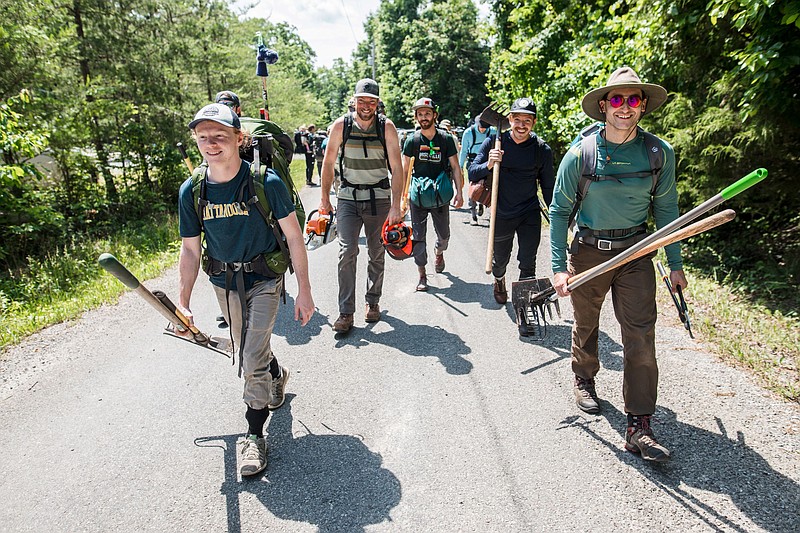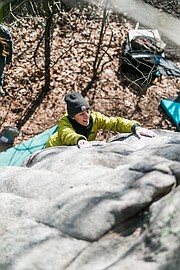Meagan Evans, the executive director of the Southeastern Climbers Coalition, said her grandpa used to take her to the woods in a wheelbarrow. Their house backed up to Moss Rock Preserve, a Hoover, Alabama, forest and boulder field abutting land owned by U.S. Steel.
"We'd scramble around on the boulders and have a good time," Evans said. Then he'd put her back in the wheelbarrow, and they'd return home to have Popsicles on the porch in the afternoon.
Later in Florida, her boss at a zipline gig mentioned the job required upper-body strength and that a good place to build it was the local climbing gym. She joined up. When she eventually returned to Alabama and Moss Rock Preserve, she saw the boulders with fresh eyes and purchased a membership at the Southeastern Climbers Coalition as a way to give back — and get discounted gear.
Now entering its third decade, nonprofit Southeastern Climbers Coalition aims to open, manage and preserve climbing areas in Alabama, Georgia and Tennessee. It also helped define Evans' understanding of what it meant to be a climber, attuning her to the ways land is — and could be — used in the Southeastern U.S.
Early on, Evans volunteered on a trail crew at Steele, a sandstone cliff network in Alabama that the coalition bought for $55,000 around 2009. The crew cut logs and removed brush from trails and cleaned the climbing site shed. The experience fanned her emerging sense that being a climber meant more than just climbing.
In her new milieu, she met her husband, and around 2017, after she worked for a period at an urban park in Birmingham, the couple headed west. They quit their jobs and drove to British Columbia, and on the return trip spent time in Leavenworth, Washington, on the eastern edge of the Cascade Range.
Near their campground was a riverside trail running the length of the town. She saw people in wheelchairs, kids on bikes, post-work joggers and elderly couples on strolls. Seeing such a diverse group of people enjoy their access to nature inspired her.
"It was in that moment that I just was like, 'Oh my gosh. This is what I'm meant to be doing,'" she said.
Photo Gallery
Southeastern Climbers Coalition works to inspire and teach the next generation of climbers
The American West is defined by its vast tracts of public land. The Southeastern Climbers Coalition works in a region where the majority of green spaces are privately owned, thus limiting public access to some areas. When Evans returned to Alabama around 2019, she began volunteering in earnest for the coalition. In 2021, she became its executive director.
Like many other places, the quantity of climbers in the Southeast U.S. has grown extremely fast over recent decades. Crags are crowded. The old mentorship systems have changed. People now learn through YouTube, or easy-to-access climbing gym classes. New climbers use apps to get to the trailhead — but they don't have anyone to show them where to park, just one potential issue among many.
The Southeastern Climbers Coalition dates to the early 1990s, when climbers organized to fix trails and soothe tensions over overuse and erosion issues at National Park Service-owned Sunset Rock on Lookout Mountain. Today, the coalition still helps maintain public land, but it also works with private landowners to develop agreements to preserve climbing access, contingent on climbers respecting that land.
In some situations, the coalition will work to buy land outright. In its history, this has happened around 10 times, Evans said. It's a big deal.
In 2016, for example, the coalition and other major funders bought and developed a large parcel of land known as Denny Cover near Jasper, Tennessee, for more than $1 million. As planned, after its purchase, Denny Cove was transferred to the State of Tennessee, which has more resources to properly manage the site.
Smaller climbing areas purchased by the coalition, like Woodcock Cove near Dunlap, Tennessee, will likely remain in the nonprofit's hands for the foreseeable future, though this could change if the state or another suitable group offers to take it over.
Evans feels the Southeastern climbing community has displayed uncommon grit in its fight to preserve climbing access — the coalition now helps manage more than 40 sites. Recalling her early days at Moss Rock and beyond, Evans said she became attracted to climbing because it stilled her mind and drew her into the present moment.
"I was chasing that feeling," she said, "and still am today."

